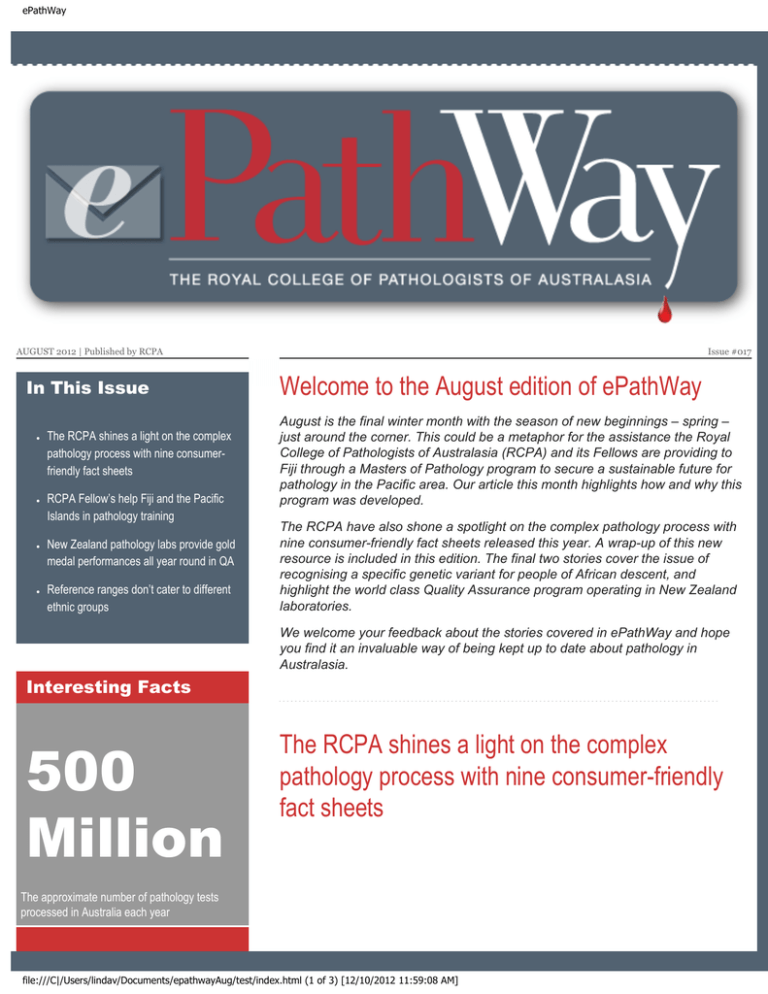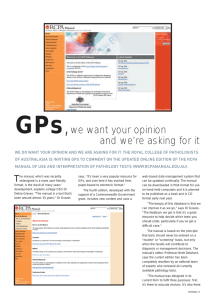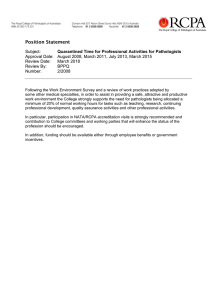Welcome to the August edition of ePathWay In This Issue
advertisement

ePathWay AUGUST 2012 | Published by RCPA In This Issue ● ● ● ● The RCPA shines a light on the complex pathology process with nine consumerfriendly fact sheets RCPA Fellow’s help Fiji and the Pacific Islands in pathology training New Zealand pathology labs provide gold medal performances all year round in QA Reference ranges don’t cater to different ethnic groups Issue #017 Welcome to the August edition of ePathWay August is the final winter month with the season of new beginnings – spring – just around the corner. This could be a metaphor for the assistance the Royal College of Pathologists of Australasia (RCPA) and its Fellows are providing to Fiji through a Masters of Pathology program to secure a sustainable future for pathology in the Pacific area. Our article this month highlights how and why this program was developed. The RCPA have also shone a spotlight on the complex pathology process with nine consumer-friendly fact sheets released this year. A wrap-up of this new resource is included in this edition. The final two stories cover the issue of recognising a specific genetic variant for people of African descent, and highlight the world class Quality Assurance program operating in New Zealand laboratories. We welcome your feedback about the stories covered in ePathWay and hope you find it an invaluable way of being kept up to date about pathology in Australasia. Interesting Facts 500 Million The RCPA shines a light on the complex pathology process with nine consumer-friendly fact sheets The approximate number of pathology tests processed in Australia each year file:///C|/Users/lindav/Documents/epathwayAug/test/index.html (1 of 3) [12/10/2012 11:59:08 AM] ePathWay More than 70% The percentage of medical diagnoses associated with pathology tests Almost 100% The percentage of cancer diagnoses associated with pathology tests Source: Pathology – The Facts (RCPA) http://www.rcpa.edu.au/ Publications/Pathology_Facts.htm Important Message When it comes to pathology, what most people see is not all they get! A visit to a collection centre for a blood test, or the specimen ‘sent to the lab’ during an operation, is only one part of a complex process that is invisible to most people. The Royal College of Pathologists of Australasia (RCPA) has therefore brought this process to the people through nine consumer-friendly fact sheets which outline the benefits and risks of pathology. read more » RCPA Fellow’s help Fiji and the Pacific Islands in pathology training It would be easy to sit back and rest on your laurels as a Pathologist when you work in a country with a world class pathology system. But if you worked in a country with very few trained Pathologists and an inadequate pathology system, then good neighbours are a blessing. And they don’t come any better than the Royal College of Pathologists of Australasia (RCPA) and its Fellows who have thrown their support behind a Masters of Pathology degree in Fiji to secure a sustainable pathology service for our neighbours. read more » has an important message for you. Click to see the message! Suggest to a friend Know someone who might be interested in this website? Why not suggest the website to them. New Zealand pathology labs provide gold medal performances all year round in QA What do the Olympic games and the major quality assurance review for New Zealand’s pathology laboratories have in common? They both occur every four years. But unlike Olympic file:///C|/Users/lindav/Documents/epathwayAug/test/index.html (2 of 3) [12/10/2012 11:59:08 AM] ePathWay Previous Editions Did you miss something from last month? You can view our previous editions at any time. Subscribe Now! Subscription is easy! Simply fill in our subscription form. Links RCPA Manual LabTest Online athletes who can come last in their event with little ramification other than disappointment, laboratories must provide gold medal winning performances all year round. And that’s what New Zealand’s labs deliver through their world class Quality Assurance (QA) system. read more » Reference ranges don’t cater to different ethnic groups When a pathology laboratory receives a blood sample, the pathology staff cannot tell if it’s from a child or adult, male or female, or from a person of Caucasian or African descent just by looking at it. They rely on information on the request form for this detail because all blood looks the same - until it is analysed. That’s when its secrets are revealed. But sometimes the results are still a puzzle thanks to conditions related to genetic variants such as Benign Ethnic Neutropaenia. read more » Copyright © 2012 The Royal College of Pathologists of Australasia RCPA - Durham Hall - 207 Albion St Surry Hills NSW 2010 AUSTRALIA | (+61) 2 8356 5858 | www.rcpa.edu.au Privacy Policy | Legal | Disclaimer Unsubscribe file:///C|/Users/lindav/Documents/epathwayAug/test/index.html (3 of 3) [12/10/2012 11:59:08 AM] ePathWay - Article One AUGUST 2012 | Published by RCPA Issue #017 The RCPA shines a light on the complex pathology process with nine consumer-friendly fact sheets When it comes to pathology, what most people see is not all they get! A visit to a collection centre for a blood test, or the specimen ‘sent to the lab’ during an operation, is only one part of a complex process that is invisible to most people. The Royal College of Pathologists of Australasia (RCPA) has therefore brought this process to the people through nine consumerfriendly fact sheets which outline the benefits and risks of pathology. “These fact sheets are an easy-to-read and comprehensive tool to increase understanding of what pathology is, and to increase awareness about the complexity of the process,” explains Dr Debra Graves, Chief Executive Officer of the RCPA. “They were initiated by the RCPA and funded by the Australian Government Department of Health and Ageing, and were loosely based on a British publication titled Making Sense of Testing1. But we put our own stamp on them and they are now available on the RCPA’s website2.” file:///C|/Users/lindav/Documents/epathwayAug/test/one.html (1 of 2) [12/10/2012 11:59:09 AM] ePathWay - Article One Seven of the fact sheets were designed to answer questions about the pathology process at logical steps along the way. These include: ● Who works in pathology and what do they do? ● Why do I need a pathology test? ● Consent – What you need to know ● Where can I have a pathology test? ● How safe is the pathology testing process? ● What should I know about pathology test results? ● How are pathology test fees calculated? Two more fact sheets focus on the dynamic issues of genetic testing and Direct-to-Consumer genetic testing. “All of the fact sheets were a collaborative process with input from pathologists, consumers, general practitioners (GPs) and physicians,” explains Dr Graves. “The information in the two genetic fact sheets was also reviewed by representatives from the Human Genetics Society of Australasia (HGSA).” Dr Graves says business cards promoting the fact sheets are being distributed to some GP surgeries and pathology collection centres. “The RCPA hopes GPs will use them as a resource for their patients because they are a valuable tool for consumers and GPs,” says Dr Graves. “And while the fact sheets are Australia-focussed, because they were funded by the Australian Government, much of the information is also applicable to the pathology process in other countries as well.” 1. The link to the RCPA’s nine fact sheets is: http://www.rcpa.edu.au/Publications/Pathology_Facts.htm 2.http://www.senseaboutscience.org/data/files/resources/6/Making-Sense-of-Testing.pdf « Back to Home Page Copyright © 2012 The Royal College of Pathologists of Australasia RCPA - Durham Hall - 207 Albion St Surry Hills NSW 2010 AUSTRALIA | (+61) 2 8356 5858 | www.rcpa.edu.au Privacy Policy | Legal | Disclaimer Unsubscribe file:///C|/Users/lindav/Documents/epathwayAug/test/one.html (2 of 2) [12/10/2012 11:59:09 AM] ePathWay - Article Four AUGUST 2012 | Published by RCPA Issue #017 RCPA Fellow’s help Fiji and the Pacific Islands in pathology training It would be easy to sit back and rest on your laurels as a Pathologist when you work in a country with a world class pathology system. But if you worked in a country with very few trained Pathologists and an inadequate pathology system, then good neighbours are a blessing. And they don’t come any better than the Royal College of Pathologists of Australasia (RCPA) and its Fellows who have thrown their support behind a Masters of Pathology degree in Fiji to secure a sustainable pathology service for our neighbours. “There is a major need for trained Pathologists in the Pacific area and the Masters program is taking up this challenge with the support of the RCPA and its Fellows,” explains Professor Konrad Muller, Professor Emeritus of Pathology at the University of Tasmania. “Our aim is to have competent Pathologists to cover most areas of pathology in the Pacific area.” Dr Raghwa Sharma, Anatomical Pathologist at Westmead Hospital in Sydney, says the RCPA sent a delegation of Pathologists to Fiji in 2010 to assess its resources and needs. The delegation also met with the Minister of Health in Fiji, the Commissioner of Police (for forensic issues), the Dean of the Fiji School of Medicine, the Vice Chancellor of Fiji National file:///C|/Users/lindav/Documents/epathwayAug/test/two.html (1 of 2) [12/10/2012 11:59:09 AM] ePathWay - Article Four University and Australian Embassy representatives. “We needed to make sure key stakeholders were on board to ensure the proposed Masters program would be successful,” he says. The Masters program kicked off this year at the Fiji School of Medicine through the Fiji National University with five trainees enrolled in the inaugural class. Prof Muller says the first two years comprise the Diploma component and the final two years are the Masters component. “Anatomical Pathology is a major component of the whole program because of the range of diseases that can be diagnosed with a microscope,” he explains. “Microbiology is also a high priority because of the diseases that are seen over there. For example, after the floods earlier this year there were cases of Typhoid Fever, Leptospirosis and Dengue Fever. The program also covers other areas such as Forensic, Haematology and Chemical Pathology.” Dr Sharma is coordinating the roster of Fellows from Australia and New Zealand who are visiting Fiji to present lectures in their areas of expertise. He has also been donating his time and expertise to our Pacific neighbours for about 10 years by receiving difficult cases to interpret and report on, and by travelling to Fiji to do clinical work to give the few Pathologists on the ground there a much needed break. He also provides second opinions and advises on difficult cases while he is there. “My work to date has been on an ad hoc basis so I am very excited that there is now a more formal process in place. These countries are our neighbours and they need our help. The dire shortage of Pathologists is an issue across all Pacific Island countries and Fiji may be the site for pathology training for them as well.” And how much does all of the combined expertise of the RCPA’s Fellows cost the Fiji School of Medicine? Nothing! They are donating their time and expertise for free. But the difference they are making to the lives of our neighbours by training Pathologists to secure a sustainable pathology service in the Pacific area is inestimable. An invitation to join the program … If Fellows of the RCPA would like to participate in this program they should contact Dr Raghwa Sharma at Raghwa. Sharma@swahs.health.nsw.gov.au, or on 02 9845 6222. « Back to Home Page Copyright © 2012 The Royal College of Pathologists of Australasia RCPA - Durham Hall - 207 Albion St Surry Hills NSW 2010 AUSTRALIA | (+61) 2 8356 5858 | www.rcpa.edu.au Privacy Policy | Legal | Disclaimer Unsubscribe file:///C|/Users/lindav/Documents/epathwayAug/test/two.html (2 of 2) [12/10/2012 11:59:09 AM] ePathWay - Article Two AUGUST 2012 | Published by RCPA Issue #017 New Zealand pathology labs provide gold medal performances all year round in QA What do the Olympic games and the major quality assurance review for New Zealand’s pathology laboratories have in common? They both occur every four years. But unlike Olympic athletes who can come last in their event with little ramification other than disappointment, laboratories must provide gold medal winning performances all year round. And that’s what New Zealand’s labs deliver through their world class Quality Assurance (QA) system. ““The QA system in New Zealand is robust and has been embraced by the profession,” explains Dr Richard Massey, Anatomical Pathologist at Pathology Associates Limited in New Zealand. “For example, no privately owned laboratories can operate without being accredited, and while some publicly funded laboratories in hospitals can go without accreditation, they don’t.” New Zealand’s premier accreditation body is International Accreditation New Zealand (IANZ)1 which provides accreditation for a range of laboratories and technical services. IANZ is also part of the Testing Laboratory Registration Council (an autonomous Crown entity established in 1972), as well as a full signatory member of the International Laboratory file:///C|/Users/lindav/Documents/epathwayAug/test/three.html (1 of 2) [12/10/2012 11:59:09 AM] ePathWay - Article Two Accreditation Cooperation (ILAC) and the Asia Pacific Laboratory Accreditation Cooperation (APLAC). So what does it take to be IANZ accredited in New Zealand? “IANZ conducts a four yearly full technical assessment of every laboratory as well as annual external reviews, and in the intervening years they also conduct surveillance assessments,” explains Dr Massey. “During the full technical assessment, assessors from IANZ look at process documentation, while peer assessors from pathology and scientific disciplines assess the processes in the area of their specialty.” Dr Massey says most laboratories view these assessments as a validation of the high QA processes that are already in place rather than as a stand-alone exercise. “Every discipline in a laboratory has their own internal quality assurance systems in place, and if everything is working as it should then the external assessments are just a routine visit. Many laboratories also employ a full-time Quality Assurance Manager.” IANZ also requires laboratories that offer genetic testing to comply with Australia’s National Pathology Accreditation Advisory Council (NPAAC) guidelines. They have also entered into a mutual recognition arrangement the National Association of Testing Authorities (NATA) which is Australia’s accreditation body2. With so much at stake with pathology test results, it’s reassuring to know that every laboratory in New Zealand is accredited and subject to ongoing assessments and reviews, both internally and externally. That’s probably why New Zealand has been a world leader in the adoption of external QA processes, especially since these checks and balances have been embraced by the pathology profession as part of their routine operations. 1. To find out more about IANZ go to www.ianz.govt.nz 2. Australia’s QA process is covered in issue 015 June 2012 edition of ePathWay http://epathway.rcpa.edu.au/ previous/015_0612.pdf « Back to Home Page Copyright © 2012 The Royal College of Pathologists of Australasia RCPA - Durham Hall - 207 Albion St Surry Hills NSW 2010 AUSTRALIA | (+61) 2 8356 5858 | www.rcpa.edu.au Privacy Policy | Legal | Disclaimer Unsubscribe file:///C|/Users/lindav/Documents/epathwayAug/test/three.html (2 of 2) [12/10/2012 11:59:09 AM] ePathWay - Article Three AUGUST 2012 | Published by RCPA Issue #017 Reference ranges don’t cater to different ethnic groups When a pathology laboratory receives a blood sample, the pathology staff cannot tell if it’s from a child or adult, male or female, or from a person of Caucasian or African descent just by looking at it. They rely on information on the request form for this detail because all blood looks the same - until it is analysed. That’s when its secrets are revealed. But sometimes the results are still a puzzle thanks to conditions related to genetic variants such as Benign Ethnic Neutropaenia. “Benign Ethnic Neutropaenia was flagged as an issue by the General Practitioner Refugee Special Interest Group when they became aware that some patients were being investigated extensively for what is essentially a normal genetic variant,” explains Dr James Daly, Clinical Haematologist at QML Pathology and Chair of the Haematology Advisory Committee at the Royal College of Pathologists of Australasia (RCPA). “Benign Ethnic Neutropaenia is a common cause of apparent neutropaenia in the African population but that doesn’t mean the initial finding of neutropaenia should not be followed up for people of African descent.” Neutropaenia is a condition characterised by a decreased number of neutrophils in the bloodstream. Neutrophils are the most common type of white blood cell and the first immune cells to arrive at the site of an infection. Benign Ethnic Neutropaenia occurs when a person has a consistently low neutrophil count without evidence of increased susceptibility to infection or any other adverse effect. It affects between 10 and 20 percent of people of African descent. Dr Daly says Benign Ethnic Neutropaenia is linked to a genetic difference which probably evolved through evolutionary pressure to confer protection against malarial parasites. Over 70 percent of people of African descent have the Duffy Null blood group where they lack the Duffy blood group antigens which are located on the surface of red blood cells. The Duffy file:///C|/Users/lindav/Documents/epathwayAug/test/four.html (1 of 2) [12/10/2012 11:59:10 AM] ePathWay - Article Three antigens are also known to be the receptors for the human malarial parasites Plasmoduim vivax and Plasmodium knowlesi, so lacking these antigens provides some resistance to Malaria. “The Duffy Null blood group is very common in Africans but exceptionally rare in Caucasians,” explains Dr Daly. “It is not clear how lacking the Duffy blood group antigen can result in a low neutrophil count, but we know that people with this blood group have a lower neutrophil count than the general population and perhaps 10 to 20 percent of them may have a neutrophil count that is actually below our normal reference range.” Dr Daly says if a doctor suspects that a patient has Benign Ethnic Neutropaenia they should seek advice from a Pathologist. “Failing to recognise Benign Ethnic Neutropaenia can result in unnecessary investigation of mild Neutropaenia in patients of Africa descent, although the diagnosis should only be made after follow-up tests and exclusion of other potential causes, ” he explains. “We don’t change our reference ranges based on race, so people with this condition will show up as having an abnormally low neutrophil count when measured against our normal reference ranges which are set to a cater for our predominantly Caucasian population.” When blood samples arrive at the laboratory they are all analysed according to the set reference ranges which only vary for some tests based on age or sex. They are not set to cater for ethnic differences. This is one reason why a person’s race may be important to complete a diagnosis, especially when it comes to conditions related to genetic variants such as Benign Ethnic Neutropaenia. « Back to Home Page Copyright © 2012 The Royal College of Pathologists of Australasia RCPA - Durham Hall - 207 Albion St Surry Hills NSW 2010 AUSTRALIA | (+61) 2 8356 5858 | www.rcpa.edu.au Privacy Policy | Legal | Disclaimer Unsubscribe file:///C|/Users/lindav/Documents/epathwayAug/test/four.html (2 of 2) [12/10/2012 11:59:10 AM]




